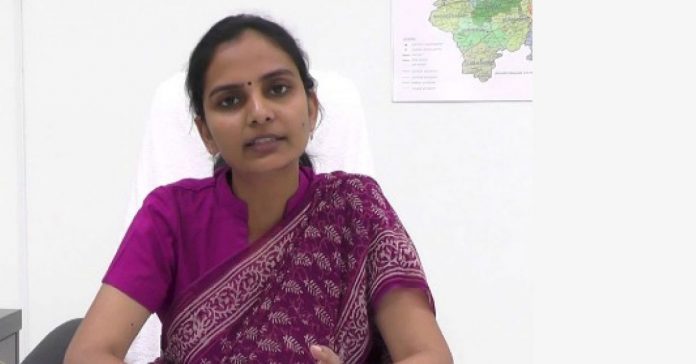Adilabad region has the history of inter-tribal violence. From curfews to shutting down of data connectivity, the region had seen it all. In such a situation, this IAS officer was posted in this region and a village named after IAS officer.
Her posting was done in a hush-hush manner as the clashes took a violent turn. The decision was taken almost overnight. The people had lots of mistrust when she had taken charge.
Divya Devarajan, a 2010-batch IAS officer was posted to Adilabad, Telangana amidst the tribal disturbances of 2017. She is an open-minded and soft-spoken bureaucrat.
She managed to earn the trust of the tribals and to find a place in their hearts, she learnt their language – Gondi in three months to make a connection with them, and it wasn’t just about being able to greet them.
She firmly believed in the power of dialogue and discourse, which could pave way to get through the community for negotiation to work.
Within three months, she became proficient in the language of the Gonds (Gondi) enough to have a conversation with the people. The people only wanted someone to listen. And she did. And her efforts paid off.
Divya, pursued her engineering from BITS Pilani. She had many reasons to be motivated to become an IAS officer.
Divya’s grandfather, who was a farmer in Tamil Nadu would hide in the local temple out of sheer fear of the officials coming to collect the money.
This incident made her realise how much the administration can do to help farmers, and change their lives by listening to their problems and giving concrete solutions.
That’s what she did in Adilabad, she provided monetary and ambulance support to tribal patients who needed surgeries and better treatment in Hyderabad whenever needed.
Another reason behind her career choice was Divya’s father, who worked with the Tamil Nadu Electricity Board (TNEB). He often spoke about the joy he felt at serving the people. Back in the 60s when he helped electrify villages, the happiness that he saw on farmers’ faces was his job satisfaction and she also wanted to feel that as well. Divya realised early that being part of the service would allow her to make a large-scale impact.
She appointed special tribal coordinators, language translators in government hospitals, making the administrative office more accessible, to learning the language herself, Divya went from being just an “Officer Madam” to a member of their families.
And now, as a new District Collector takes charge, the villagers paid their tribute to her by naming a village in after her.
Recently, the people of Adilabad named a village “Divyaguda” in Divya’s honour. This gesture shows the kind of impact she has left on the people and their gratitude towards her for bringing a change in their lives.
Divya is now appointed as Secretary and Commissioner for Women, Child, Disabled and Senior Citizens in February 2020.
The community that Divya worked so closely with won’t forget the proactive lady who believed in providing quick solutions to several issues. Homing in on the basic problems that the region faced – high rates of illiteracy, unemployment, sanitation, irrigation health and floods, among others, she also worked incessantly to resolve the conflicts in the area.
She appointed a special officer for the welfare of particularly vulnerable tribal groups to address their issues with more focus and better efficacy. It was important to understand their issues from their perspective.
First and foremost thing she made the office accessible to everyone and she visited each household in the village and knew all of them by their names.
They trusted her as they saw her make a genuine effort to understand them. She helped them solve certain long-pending land issues in favour of tribals which were represented in the Monday Grievance Redressal sessions. Also, she streamlined cotton procurement and created platforms for tribals to access Minimum Support Price for their produce.
Divya encouraged the angry tribes to use the legal and constitutional means to find solutions to their problems. She appointed PESA (The Provisions of the Panchayats (Extension to Scheduled Areas Act, 1996) coordinators at Gram Panchayat level and quickly filled the vacancies to create awareness on their rights and how to use them. She also helped revive their traditional panchayats called Rai Centers and engaged them in developmental activities.
Furthermore, to duly honour and preserve the culture of the tribal communities, Divya made efforts to officially support their main festivals like Dandari-Gussadi and Nagoba Jatra and document their traditions in the form of a documentary.
When asked about a village being named after her, Divya, just laughs and says that she has miles to go and people to help.


